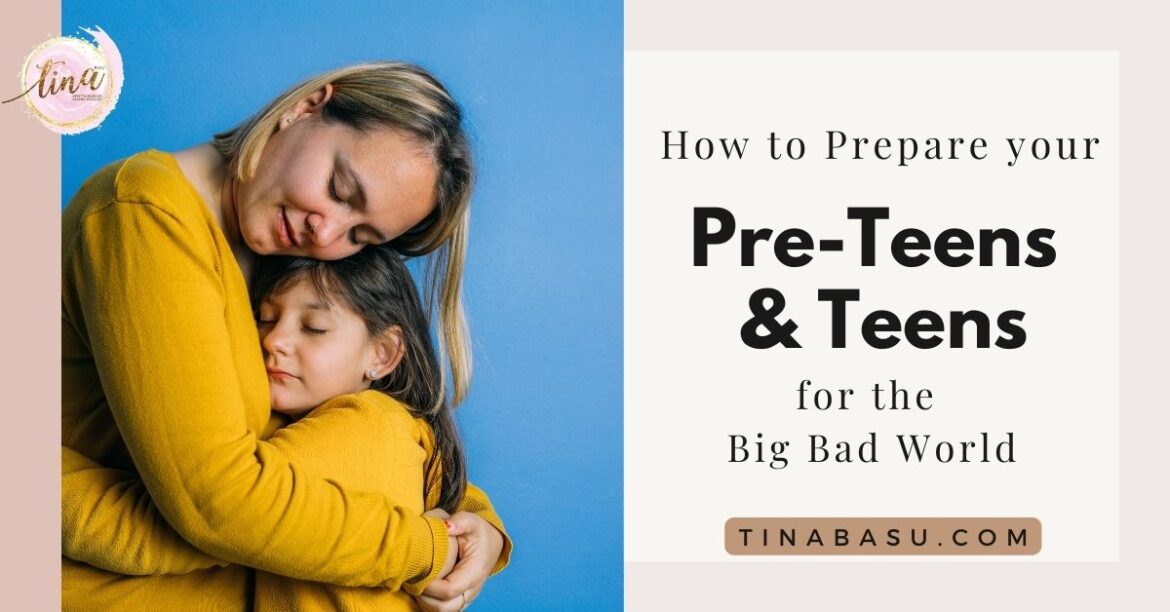How do you prepare your pre-teen or tween for the big bad world without them perceiving you as an authoritarian? How to discuss difficult topics like sex and STIs?
As a parent, we take it upon ourselves to provide the best for our kids – both in terms of values and materials. There is always a deep-rooted fear in a parent’s heart – “Will I fail as a parent?”
There are several questions haunting a parent – “Am I instilling the right values?”, “Will my child be able to differentiate good from bad?”, “Will he make the right choices when it comes to health, profession, and relationships?”
And often we ask ourselves – “What can I do to prepare my child for the big bad world?”
While we make efforts to spend quality time with our kids so that they have our undivided attention, it’s imperative for us to provide them with correct information, and a healthy environment for communication, at home.
Here are some tips to prepare your pre-teen for the big bad world

#1 Allow them to address a situation instead of overreacting
We have seen what helicopter parenting does. Clinical psychologist and author Dr. Steiner-Adair opines that parents often jump into situations amplifying the drama which results in throwing fuel on an emotional adolescent brain. Allow your young pre-teen to handle situations in their own way.
#2 Do not allow loss in communication
While extending independence to pre-teens, and teens, do not close doors for communication. Make your availability and presence known – more as a friend than as a parent. Communication is the key to solving all problems that they might face in the future.
#3 Talk about difficult topics like sex and STIs
It is important for parents to talk to adolescents, pre-teens, and teens about difficult topics like relationships, heartbreaks, emotions, and STIs (sexually transmitted infections). Talking to kids about safe sex and STIs doesn’t mean they will become sexually active. But providing them with the right information will help them understand the risks, and they’ll know how to protect themselves. We’ll elaborate on this later in the blog.
#4 Don’t be Judgemental
This is the age where pre-teens are taking in all the cues from parents. It’s okay to nurture the emotional side of your son and accept if your daughter has a keen interest in taekwondo. Not every child has to fit into societal norms. Encourage their interests without being judgemental which will consequently eliminate self-doubt and boost their confidence to face the world.

Discussing sex or sex-ed at home is not a taboo
We know which one of the above is the elephant in the room – so let’s dig deeper into it. Sometimes it can be hard to find the right time and environment to talk about sex and STIs with your child. A good time to start the conversation might be when your child asks questions about sex, or you watch something on TV and discuss it. Sex is not a taboo, correct information about sex and STIs is as important for preteens, as it is for parents.
The most common forms of STIs, that your teen might already be aware of, are HIV and AIDS. Do you know HPV or Human papillomavirus is the most commonly transmitted viral infection of the reproductive tract? 1 In most HPV cases, the infections clear up on their own in the body based on one’s immune system. However, in cases where the infection remains, the virus may develop into cancer.7 Not just that, HPV is actually the cause of almost all cases of cervical cancer. Yes, this STI brings a risk of certain types of cancers!
What’s more, is, nearly all sexually active people are infected with HPV within months to a few years of becoming sexually active.2
HPV is not widely advertised, and little knowledge is out there for adolescents to read up on it. It is better that you and your child are both aware of this.
The first question you might be asking is – is my child at risk of contracting HPV?
Times are changing, teens are sexually active and vulnerable to contracting STIs if they do not practice safe sex.
Unfortunately, HPV can be transmitted even when an infected person has no signs or symptoms. So, anyone who is sexually active can get HPV, even if they have had sex with only one person. The risky part is that one can develop symptoms years after they have had sex with someone who is infected. This makes it hard to know when you first contracted the infection. 3
What to discuss with adolescents and pre-teens about STIs like HPV?
Make them aware of how STIs like HPV spread
- Skin to Skin Contact – One can get HPV by having vaginal, anal, or oral sex with someone who has the virus. 4
- Oral Sex or Deep Kissing – The virus can spread with any kind of sexual activity such as oral sex or deep kissing. 5
- Genital contact without sex – The horizontal transfer of HPV includes fomites, fingers, and mouth, skin contact (other than sexual) 4
Is HPV dangerous for my pre-teen or teen?
Genital HPV infections are common but can lead to genital warts, cervical precancer and other HPV-related cancers like cervical, vaginal, vulvar and anal cancers in women 5
Genital warts tend to affect teenagers or young adults. When symptoms do develop, they usually occur 2 to 3 months after the infection has been contracted.
Did you know?
Every 5 minutes, nearly one individual in India loses their life to HPV-related cancers in India. 6
How to keep my teen safe from HPV, did you ask?
Like many STDs and STIs there is no treatment for the virus itself. But HPV infection can be prevented from appearing.
- Explain concepts of safe sex – Practicing safe sex by using condoms for every sexual encounter keeps you safe from catching any STI. Using dental dams is recommended.
- Regular medical screening –It is recommended that women over the age of 21 go in for a regular screening
- Get Vaccinated with HPV vaccine – Consult experts or seek an opinion from your doctor on HPV vaccination to help prevent future health risks and safeguard wellbeing.
Kids and teens need to know about STIs. It’s best if they get the facts from someone reliable. And what’s better than getting it from you, who they trust? Be aware of your child’s needs, and emotions and always keep the door to communication open with your pre-teen or teen. Remember, it is not embarrassing to discuss STIs or sex-ed. In fact, you are preparing your pre-teen for the big bad world.
Know more about HPV and its prevention here: https://bit.ly/Letsfighthpv.
Issued in public interest with MSD India
References
1 National Health Portal,
https://www.nhp.gov.in/disease/communicable-disease/human-papillomavirus-hpv-infection-and-cervical-cancer, accessed on 5 March 2016
2 National Cancer Institute,
https://www.cancer.gov/aboutcancer/causesprevention/risk/infectious-agents/hpv-and-cancer, OCT 2021
3 Centers for Disease Control and Prevention
https://www.cdc.gov/mmwr/preview/mmwrhtml/rr5912a1.htm March 2022
4 American cancer society
5 Centers For Disease Control & Prevention
https://www.cdc.gov/condomeffectiveness/latex.html, accessed March 2022
6 Walboomers JM, Jacobs MV, Manos MM, et al. Human papillomavirus is a necessary
Cause of invasive cervical cancer worldwide. J Pathol. 1999 Sep;189(1):12-19
https://hpvcentre.net/statistics/reports/IND_FS.pdf
7 World Health Organisation. Factsheet. Human papillomavirus (HPV) and cervical cancer,
https://www.who.int/news-room/fact-sheets/detail/cervical-cancer, 3 March 2021

